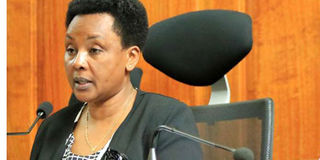Why IEBC boss Chebukati can't alter poll results

Deputy Chief Justice Philomena Mwilu, on October 17, 2017 at the Supreme Court, reads her opinion regarding whether IEBC Chairman Wafula Chebukati may edit election results. All the five judges agreed Mr Chebukati should not edit the results. PHOTO | JEFF ANGOTE | NATION MEDIA GROUP
What you need to know:
- The judges said the responsibility of verifying results was captured in the Constitution and the Elections Act. .
- They said the Court of Appeal in the Maina Kiai case had not taken away the duty of the chairman to verify the results.
Independent Electoral and Boundaries Commission chairman Wafula Chebukati cannot alter or amend results announced from the polling stations, the Supreme Court ruled.
He can only tally and verify the results to confirm if the winning candidate has met the 50-plus-one percentage vote threshold and garnered at least 25 per cent votes in at least 24 counties as required by Article 138(4) of the Constitution, the judges said, adding that if the chairman detects anomalies, he should announce the results and leave the matter to the court.
“It is, therefore, the duty of the 2nd respondent (Mr Chebukati), to bring to the attention of the public, any inaccuracies discovered by the verification of forms 34A and forms 34B even as he declares the results as generated from forms 34B to generate form 34C,” Chief Justice David Maraga, Deputy Chief Justice Philomena Mwilu, and justices Jackton Ojwang’, Smokin Wanjala and Isaac Lenaola said.
CONSTITUTION
They said the effect of such inaccuracies on an election depends on their gravity and that the national returning officer “must state whether the discrepancies affect the overall results or not”.
The five judges said the responsibility of verifying results was captured in the Constitution and Section 39 (1C) (b) of the Elections Act.
“The verification required of the 1st and 2nd respondents (IEBC and the chairman respectively) is meant to ensure accuracy or prevent fraud and also confirmation that the candidate to be declared president-elect has met the threshold set under Article 138(4) of the Constitution,” they added.
SUPREME COURT
Justice Ojwang’ read a concurring opinion, supporting the decision of the other judges who said that the matter was dealt with by the Court of Appeal in the Maina Kiai decision of 2013.
“But for whatever it may be worth, we hereby reiterate that the 1st and 2nd respondents cannot correct errors identified in forms 34B or amend the forms 34B where the same differ with the results contained in the relevant Forms 34A.
"Theirs is to expose such discrepancies and leave the resolution of such issues to the election court, in this case, the Supreme Court,” the judges ruled.
The electoral body had sought a clarification from the court, saying its September 1 judgment was not clear as to how to treat discrepancies in the two forms.
VERIFY RESULTS
The commission, through lawyer Kamau Karori, had argued that the judges criticised Mr Chebukati for announcing results that were not adding up.
However, the judges said: “On the contrary, what this court took issue with was the decision by the 2nd respondent to declare the results that had not been tested against the transmitted results in forms 34A from the 40,833 polling stations countrywide.”
They said the Court of Appeal in the Maina Kiai case had not taken away the duty of the chairman to verify the results.
JUDGMENT
The judges said they only agreed to hear the matter in order to correct the impression of an ambiguity in their judgment.
“This assumption of jurisdiction is all the more necessary so as to avert the danger of an impression being created in the mind of the public that there exists an ambiguity in the court’s judgment even where there might be none.
"If indeed there is an ambiguity, the assumption of jurisdiction will help eliminate the same,” the court said.
IEBC had maintained that whereas the Supreme Court upheld the Maina Kiai case, the judges in the majority decision explained that among the reasons they annulled the election is that the commission did not verify the results by comparing forms 34B against the results electronically transmitted in forms 34A.




